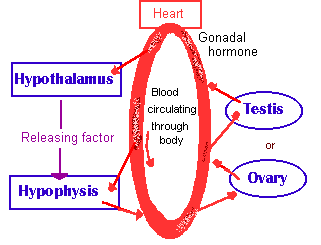

11 of 13
Role of Hormones in Human Sexuality
A hormone is a chemical substance of an endocrine gland. Endocrine glands, which are also called ductless glans, deposites the hormones into the blood stream. The blood, on its turn, carries the hormones to every part of the body.
The sex hormones are estrogen
and testosterone. Like all hormones, they are chemical messengers, substances
produced in one part of the body that go on to tell other parts what to
do. Both women and men produce both estrogen and testosterone, though in
different quantities, and both sexes produce less as they age. These hormones
seems to affect arousability by altering the threshold for erotic stimulation.
They act:
![]() centrally
- by determining the amount of change in arousal produced by a given stimulus;
centrally
- by determining the amount of change in arousal produced by a given stimulus;
![]() peripherally
- by determining the amount of receptor response to a stimulus.
peripherally
- by determining the amount of receptor response to a stimulus.
In most animal species the brain controls and regulates sexual behavior primarily by means of hormones. Man and other primates are exceptions to this role because he depends on personal experience and cultural aspects than its does on hormones. However, hormones seems to affect arousability by altering the threshold for erotic stimulation, regardless of weather the threshold in question is one of peripheral tissue sensitivity.
 The
hypophysis, also
called pituitary, is the master endocrine gland. It secretes a large number
of important hormones involved in the control of many body functions. The
targets of many of its hormones are other endocrine glands. It releases
a number of hormones for a particular gland, which then picks up the hormone
from the blood stream and is roused into activity as a result of the "message"
from the pituitary.
The
hypophysis, also
called pituitary, is the master endocrine gland. It secretes a large number
of important hormones involved in the control of many body functions. The
targets of many of its hormones are other endocrine glands. It releases
a number of hormones for a particular gland, which then picks up the hormone
from the blood stream and is roused into activity as a result of the "message"
from the pituitary.
This gland releases the hormone for a particular gland, which then picks up the hormone from the blood stream and is roused into activity as a result of the "message" from the hypophysis. This gland than produces its own hormone and discharge it into the blood stream. The activity of the hypophysis gland is controlled by chemical factors that are produced by neuroendocine cells in the brain and are passed along to it through a series of special blood vessels, the pituitary portal system.
The chemical factors released by neuroendocrine cells in the hypothalamus travel through this blood system to the pituitary and stimulate the release of pituitary hormones into the general blood circulation.
Hypothalamus
The hypothalamus, located in the brain directly above the hypophysis, is known to exert control over it by means of neural connections and hormone-like substances that are called releasing factors, the means by which the nervous system controls sexual behavior via the endocrine system.
Sexual behavior is influenced by the hypothalamus. It stimulates the pituitary gland to release the sex hormones. When levels of those hormones falls, so does sexual desire.
 Feedback control of production of gonadal hormones. The hypothalamus stimulates the hypophysis to release hormone into the blood that is circulating through the body. This hormone is picked up by the ovary or the testis, which is thereby stimulated to release a gonadal hormone into the blood stream. the gonadal hormone is detected by the pituitary and the hypothalamus, which are thereby inhibited from releasing more pituitary hormone. |
The hypothalamus secretes the appropriate releasing factor into the blood, which reaches the pituitary and stimulates it to secrete gonadotrophic hormone. In the female the target gland of the gonadotrophic hormone is the ovary. The ovary has two functions, the first one is to produce eggs, and the other is to secrete hormones (entrogen and progesterone). The ovarian hormones make feedback loops to the hypophysis and develop sexual characteristics that distinguish females from males. |
In the male the target gland of the gonadotrophic hormone is the testis. Like the ovary, the testis has a dual role: sperm production and hormone production. Androgens (testosterone) are the hormones released by the testis. Pituitary hormones stimulate the production of testicular hormones, which, in turn, regulate the production of pituitary hormone by means of feedback.
Go to the first page of this article
Author: Dr. Silvia Helena Cardoso, PhD. Psychobiologist, master and doctor in Sciences by the University of São Paulo and post doctoral fellowship by the University of California, Los Angeles. Invited Professor and Associate Researcher of the Center for Biomedical Informatics, State University of Campinas (Unicamp), Brazil.
Center for Biomedical Informatics
State University of Campinas, Brazil
Copyright 1997 State University of Campinas